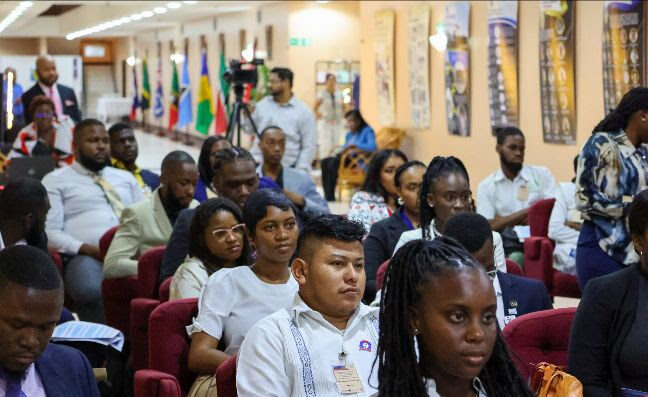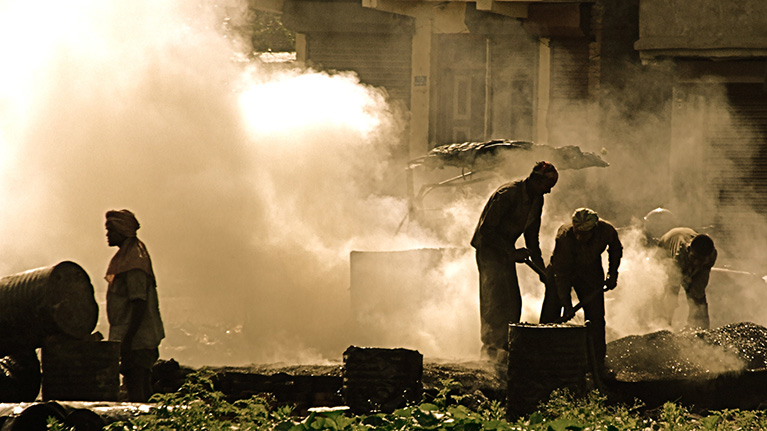This news article is a production distributed through Caribbean News Service. It is made freely available to your media and we encourage publishing and redistribution, giving credit to Caribbean News Service (CNS).
by Dizzanne Billy – CNS Contributor
PARIS, France, Dec 03 2015 – Meet the new kid in town – The Climate Vulnerable Forum (CVF). Their ability to impact the negotiations is not be underestimated. This group of developing countries from Africa, Asia, Latin America, and the Caribbean has been stealing the show at COP21 over the last few days.
CVF is a truly diverse group of countries which initially comprised of Afghanistan, Bangladesh, Barbados, Bhutan, Costa Rica, Ethiopia, Ghana, Kenya, Kiribati, Madagascar, Maldives, Nepal, Philippines, Rwanda, Saint Lucia, Tanzania, Timor-Leste, Tuvalu, Vanuatu and Vietnam, but will be accepting new members during COP21.
Brought together by their vulnerability, they define themselves as “an international partnership of countries highly vulnerable to a warming planet,“ and they serve as a “South-South cooperation platform for participating governments to act together to deal with climate change.”
From day one, CVF has been among the major champions in the amplification of the 1.5 degree Celsius goal. In spite of claims made by other negotiating countries that this goal is not scientifically sound, CVF dove in at the deep end and is proving itself to be a competitive swimmer.
The idea being bolstered is that small and developing countries need to seek their interests and they can do this together. This is not a new frontier in negotiations. The difference here is that CVF is focusing primarily on vulnerability and the fact that they emit negligible amounts of CO2 but suffer the most.
The deck has played in the CVF’s favour in more ways than one. Firstly, praise was given when it received the prestigious ‘Ray of the Day’ award, which is the good-guy version to the shameful ‘Fossil of the Day.’ Three key points standing out from the CVF’s statement which have drawn positive attention are:
- they will make their entire industries decarbonise
- they will run their entire countries on 100 percent renewable energy
- they will create a solidarity package by mid-century (2050)
Secondly and perhaps most importantly, like moth to a flame, the 1.5 degree Celsius goal has captivated the minds and hearts of young people at COP. Some may say that this is just another checkbox ticked off, but these young people are passionately supporting the 1.5 degree goal. They are standing up and speaking out about the danger that the 2 degrees goal poses to their future. Get this, these young people come from both developed and developing countries. That’s beautiful.
On day three of COP, young activists unabashedly congregated outside the negotiating halls of Le Bourget and chanted “1.5 to stay alive!” and “CVF, follow their lead!” Quite brilliant, as it attracted a lot of social media, pushing both the CVF and the 1.5 degree goal to the forefront of everyone’s minds.
CVF delegates are highlighting the importance of youth participation in implementation of climate policy. This is crucial for capacity building.
If this high-level, international conference is to produce a historic agreement among nations to reduce greenhouse gas emissions that scientists say is causing global warming, then the ambition needs to be higher. However, quite importantly, young people need to be included in a more substantial way.
I spoke with some of the young people who were present at the demonstration. Nickson Barry of Caribbean Youth Environment Network stated that “youth, climate change is our fight,” and his colleague Snaliah Mahal believes that the decisions made at this COP will affect youth significantly and therefore young people need to not only be at the negotiations but they also need to be a part of the process.
Today is Young and Future Generations Day at COP21 and if the decision-makers genuinely care about youth-inclusion then they listen to what these young people have to say. They are the ones who will have to deal with the outcomes of the decisions made today. According to Maddie Sarre of Australian Youth Climate Coalition, “young people are standing up for 1.5 degrees to stay alive because it’s our future which is threatened by leaders who are failing to make the kind of commitments we need. Young people from all countries are standing in solidarity with the climate vulnerable forum and people whose lives are written off by a temperature rise of 2 degrees.”
(Dizzanne Billy is President of the Caribbean Youth Environment Network (CYEN) in Trinidad and Tobago, where she works in the areas of education and public awareness with regard to environment and development issues. She is a climate tracker with Adopt-A-Negotiator and an advocate for climate change action).




